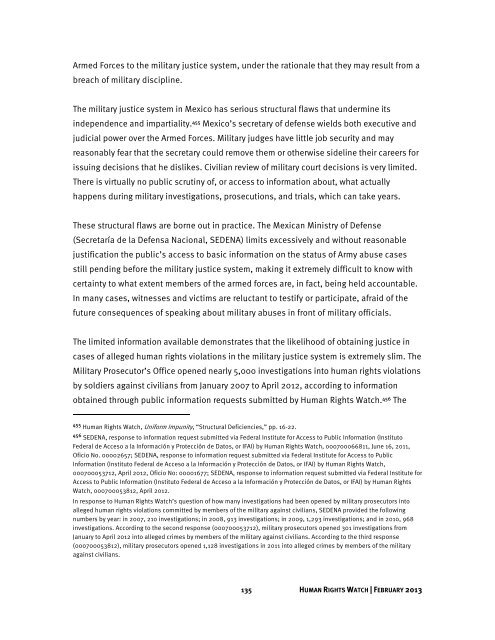Download the full report - Human Rights Watch
Download the full report - Human Rights Watch
Download the full report - Human Rights Watch
You also want an ePaper? Increase the reach of your titles
YUMPU automatically turns print PDFs into web optimized ePapers that Google loves.
Armed Forces to <strong>the</strong> military justice system, under <strong>the</strong> rationale that <strong>the</strong>y may result from a<br />
breach of military discipline.<br />
The military justice system in Mexico has serious structural flaws that undermine its<br />
independence and impartiality. 455 Mexico’s secretary of defense wields both executive and<br />
judicial power over <strong>the</strong> Armed Forces. Military judges have little job security and may<br />
reasonably fear that <strong>the</strong> secretary could remove <strong>the</strong>m or o<strong>the</strong>rwise sideline <strong>the</strong>ir careers for<br />
issuing decisions that he dislikes. Civilian review of military court decisions is very limited.<br />
There is virtually no public scrutiny of, or access to information about, what actually<br />
happens during military investigations, prosecutions, and trials, which can take years.<br />
These structural flaws are borne out in practice. The Mexican Ministry of Defense<br />
(Secretaría de la Defensa Nacional, SEDENA) limits excessively and without reasonable<br />
justification <strong>the</strong> public’s access to basic information on <strong>the</strong> status of Army abuse cases<br />
still pending before <strong>the</strong> military justice system, making it extremely difficult to know with<br />
certainty to what extent members of <strong>the</strong> armed forces are, in fact, being held accountable.<br />
In many cases, witnesses and victims are reluctant to testify or participate, afraid of <strong>the</strong><br />
future consequences of speaking about military abuses in front of military officials.<br />
The limited information available demonstrates that <strong>the</strong> likelihood of obtaining justice in<br />
cases of alleged human rights violations in <strong>the</strong> military justice system is extremely slim. The<br />
Military Prosecutor’s Office opened nearly 5,000 investigations into human rights violations<br />
by soldiers against civilians from January 2007 to April 2012, according to information<br />
obtained through public information requests submitted by <strong>Human</strong> <strong>Rights</strong> <strong>Watch</strong>. 456 The<br />
455 <strong>Human</strong> <strong>Rights</strong> <strong>Watch</strong>, Uniform Impunity, “Structural Deficiencies,” pp. 16-22.<br />
456 SEDENA, response to information request submitted via Federal Institute for Access to Public Information (Instituto<br />
Federal de Acceso a la Información y Protección de Datos, or IFAI) by <strong>Human</strong> <strong>Rights</strong> <strong>Watch</strong>, 000700066811, June 16, 2011,<br />
Oficio No. 00002657; SEDENA, response to information request submitted via Federal Institute for Access to Public<br />
Information (Instituto Federal de Acceso a la Información y Protección de Datos, or IFAI) by <strong>Human</strong> <strong>Rights</strong> <strong>Watch</strong>,<br />
000700053712, April 2012, Oficio No: 00001677; SEDENA, response to information request submitted via Federal Institute for<br />
Access to Public Information (Instituto Federal de Acceso a la Información y Protección de Datos, or IFAI) by <strong>Human</strong> <strong>Rights</strong><br />
<strong>Watch</strong>, 000700053812, April 2012.<br />
In response to <strong>Human</strong> <strong>Rights</strong> <strong>Watch</strong>’s question of how many investigations had been opened by military prosecutors into<br />
alleged human rights violations committed by members of <strong>the</strong> military against civilians, SEDENA provided <strong>the</strong> following<br />
numbers by year: in 2007, 210 investigations; in 2008, 913 investigations; in 2009, 1,293 investigations; and in 2010, 968<br />
investigations. According to <strong>the</strong> second response (000700053712), military prosecutors opened 301 investigations from<br />
January to April 2012 into alleged crimes by members of <strong>the</strong> military against civilians. According to <strong>the</strong> third response<br />
(000700053812), military prosecutors opened 1,128 investigations in 2011 into alleged crimes by members of <strong>the</strong> military<br />
against civilians.<br />
135 HUMAN RIGHTS WATCH | FEBRUARY 2013

















